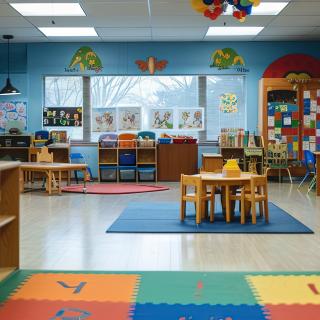
Rutgers Child Care Research Collaborative
Our research, funded by the NJ Department of Children & Families, focuses on the supply of and demand for child care in NJ.
The Center for Women and Work (CWW), the Heldrich Center for Workforce Development (Heldrich), and National Institute for the Early Education Research (NIEER) have joined together to form the Rutgers Child Care Research Collaborative for the purpose of conducting research and facilitating community conversations that develop a broad and comprehensive understanding of New Jersey’s child care landscape. Our research aims to increase understanding about the needs and interests of parents in New Jersey, the supply and motivations of the child care workforce, and the capacity of the child care sector to meet demand for child care today and into the future within our diverse state. Funding for the Rutgers Child Care Research Collaborative is provided by the New Jersey Department of Children and Families.
Early Care & Education Use Among Young Children in New Jersey in 2024
NIEER’s statewide parent surveys (2022–2024) examine how New Jersey families with children under age five use early care and education (ECE) and the factors shaping their choices. In spring 2024 (n=1,705), 76% of children were in non-parental care, increasing by child age from 64% of infants to 83% of four-year-olds. Center-based care use rises with age and income, while relative care is more common among infants, toddlers, and lower-income families. Children average 22 hours per week in care, with longer hours in center-based settings. Roughly half of families spend more than 7% of household income on child care, exceeding the federal affordability threshold. Choices are driven by affordability, location, and schedule flexibility. Quality seems to factor into choices for the families of preschoolers more than for families of younger children. Differences emerge by family structure, race/ethnicity, income, and region.

Center-Based Child Care Lead Teachers in New Jersey
NIEER surveyed New Jersey’s center-based lead teachers between November 2023 and–September 2024. This report examines teacher demographics, qualifications, pay, professional development, and working conditions, comparing those teaching preschoolers with those teaching infants and toddlers. Preschool teachers are nearly twice as likely to hold a BA or higher and earn higher wages more than teachers of younger children. One in four child care lead teachers receives government assistance; nearly a quarter are job searching, mostly to find higher pay. Seventeen percent are at risk for clinical depression—above national averages—and 40% face regular non-work stressors. Despite challenges, most report a positive work environment.

Examining New Jersey Center-Based Child Care in the 2019 National Survey of Early Care and Education
This data brief describes center-based early childhood education (ECE) in New Jersey using the 2019 National Survey of Early Care and Education (NSECE). Conducted before the COVID-19 pandemic in 2019, the survey provides a baseline of child care availability and use in New Jersey, which can be compared to subsequent years and the national landscape. Our primary analyses restrict the NSECE data to ECE centers in New Jersey (including private center-based care, public preschool, and Head Start) to examine program characteristics including schedules, enrollment capacity, reported revenue sources, and participation in quality improvement efforts.

Examining New Jersey Center Based ECE Workforce in the 2019 National Survey of Early Care and Education
This brief describes the center-based early childhood care and education (ECE) workforce in New Jersey and compares it with national workforce data using the 2019 National Survey of Early Care and Education (NSECE). The NSECE workforce survey, conducted prior to the COVID-19 pandemic, provides insight into the characteristics of New Jersey’s center-based ECE workforce and their experiences related to entering and exiting the early childhood field. The current descriptive analyses use restricted-access NSECE data specific to the ECE workforce in New Jersey (including those working in private center-based care, public preschool, and Head Start) and the national NSECE data.

Building a Data Dashboard for Child Care in New Jersey
Our report reviews New Jersey’s current child care data landscape and outlines how the state could modernize and integrate systems to better track supply, demand, access, and outcomes. It inventories key data sources (e.g., licensing/quality systems, subsidy and payment data, Pre-K enrollment, Head Start, workforce records) and identifies gaps such as limited cross-program linkages, inconsistent definitions, and timeliness/quality issues. The authors recommend a governance framework, standardized data elements (including provider- and child-level IDs), formal data-sharing agreements, and routine public reporting with equity-focused breakdowns. A phased implementation roadmap—beginning with priority use cases and pilot dashboards—aims to deliver actionable insights for families, state agencies, and policymakers while protecting privacy.

